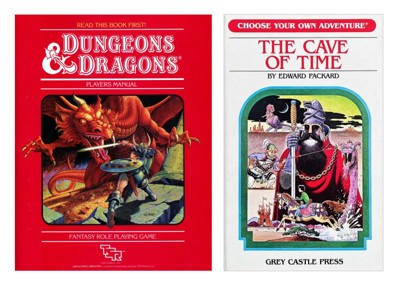
I loved role-playing games when I was younger. I spent way too much time and money on Dungeons and Dragons, Champions, Traveller, and other tabletop RPGs.
If you’ve never played, RPGs are basically “Let’s Pretend” with rules. You create a “character” by codifying their personal attributes (strength, intelligence, agility, etc.) and you “role play” them through situations (fighting a dragon, stealing a painting, etc.) while using a rule system and random die rolls to determine what happens.
But weirdly, even more than playing, I would often just read rulebooks. I bought rulebooks for games I never played (I still do), because I was just fascinated by attempts to put rules around simulations of life. Trying to drill a human identity down to values, then use rules and randomization to try to emulate all the possibilities of life itself is ambitious. I loved evaluating how different gaming systems tried to handle this.
I see lot of parallels in MarTech. We’re basic doing the same thing – we’re distilling people down to persona characteristics that we quantify, then we’re reacting to what they do with rules. We put paths in front of them, like the old Choose Your Own Adventure books – if they do this, then we do this, and then they do that, and then we do that, etc.
We’re constantly trying to predict what they’ll do and determine how we should react. It’s like being a Dungeon Master all over again.
Lately, I’ve been playing around with interactive fiction and narrative game design. There’s a great system called Twine that will let you create stories through which your read can choose their own path. There are lots of videos and resources that go into the philosophy of architecting branching narratives.
I feel like this medium might be able to teach us more about how people move through domains of information. The concept is the same – categorize the type of person they are, predict what you think they’ll do, and try to control (or at least react accurately to) those decisions, to get them to a destination.
I’ve done some research on writing interactive fiction, and it seems to boil down to “know the path you want them to take.” Do we do this when planning customer journeys? Do we know what that path looks like, then try to put rules and alternate paths down to get them to that same destination? Or are we mystified and surprised when they do…well, anything?
I have no greater point except that game design and interactive fiction writing probably have some significant crossovers with MarTech, for reasons that are really obvious when you peel back the covers. There are a lot of parallels.